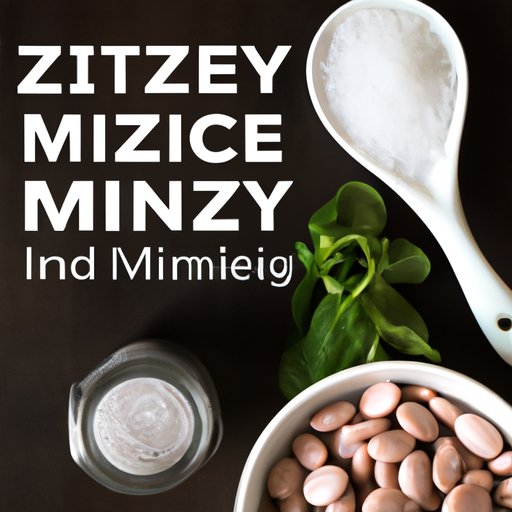Introduction
Zinc is a vital mineral that plays a crucial role in maintaining good health. It’s naturally found in various foods, including meat, seafood, and legumes. Zinc supplements offer a convenient way to ensure optimal intake of this essential nutrient. However, as with any supplement, taking too much zinc can have adverse effects on your health. In this article, we’ll explore the pros and cons of taking zinc supplements, how much zinc is too much, dangers of overdosing, how to find the appropriate dose for your health, the interplay between zinc and immunity, the risks of nutrient imbalances, and alternative strategies for a balanced diet.
The Pros and Cons of Taking Zinc Supplements: What You Need to Know
There are numerous potential benefits of taking zinc supplements. Zinc supports healthy skin, promotes wound healing, aids taste and smell, and enhances the immune system. It can also benefit cognitive health and support healthy blood sugar levels. However, taking zinc supplements can also cause adverse effects, including nausea, diarrhea, vomiting, headache, and abdominal pain. It can also interact with certain medications, such as antibiotics and diuretics. Therefore, it’s essential to consult with your healthcare provider before taking zinc supplements.
How Much Zinc is Too Much? A Comprehensive Guide
The recommended daily intake (RDI) of zinc varies depending on age and gender. Adult men need 11 milligrams, while adult women need 8 milligrams. Pregnant or breastfeeding women need more zinc, around 11-13 milligrams per day. Children’s needs vary by age, ranging from 3-8 milligrams per day for toddlers and up to 11 milligrams for adolescent boys. The maximum safe daily intake of zinc is 40 milligrams per day.
Several factors can influence how much zinc a person should take, such as their diet, age, lifestyle, and health status. Vegetarians and vegans may need more zinc due to the reduced bioavailability of plant-based zinc. People with certain medical conditions, such as celiac disease or Crohn’s disease, may also need more zinc due to reduced absorption. However, it’s crucial to avoid exceeding the maximum safe daily intake of zinc to prevent adverse effects.
The Dangers of Overdosing on Zinc: Symptoms and Possible Consequences
Overdosing on zinc can lead to zinc toxicity, which can cause harmful symptoms. The symptoms of zinc overdose can include diarrhea, nausea, vomiting, headaches, fatigue, and abdominal cramps. Long-term excessive intake of zinc can cause more severe consequences, such as copper and iron deficiency, immune dysfunction, and nerve damage. Overloading on zinc can also increase the risk of prostate cancer in men.
Zinc Supplement Dosage: Finding the Sweet Spot for Your Health
Determining the appropriate dose of zinc depends on several factors, such as age, gender, diet, health status, and lifestyle. It’s crucial to consult with a healthcare provider before taking any supplements, including zinc. Zinc supplements are available in various forms, such as tablets, capsules, and lozenges. It’s best to take zinc supplements with food to enhance absorption and reduce the risk of adverse effects. It’s also essential to monitor your zinc intake to ensure you stay within safe levels.

Zinc and Immunity: Optimizing Your Health without Excess
Zinc plays a crucial role in supporting the immune system. It helps the body produce white blood cells, which are essential for fighting infections. However, excessive zinc intake can have adverse effects on immunity. Taking more than 40 milligrams of zinc supplements daily can reduce immune function and increase susceptibility to infections. Therefore, it’s crucial to maintain adequate zinc levels without overloading on supplements.
Nutrient Interactions of Zinc: Understanding the Risks of Overloading
Zinc interacts with other nutrients, such as copper, iron, and magnesium, and excessive intake of one nutrient can cause imbalances in others. Taking high doses of zinc supplements can cause copper and iron deficiencies and disrupt nutrient absorption. Therefore, it’s essential to balance zinc intake with other crucial nutrients to ensure optimum health.
Alternative Strategies for Health: Balancing Zinc and Other Key Minerals
There are various ways to incorporate zinc into your diet besides supplements. Foods rich in zinc include oysters, beef, chicken, beans, nuts, and whole grains. It’s best to eat a balanced diet that includes a variety of nutrient-dense foods to enhance overall health. Additionally, alternative health supplements, such as herbal remedies and vitamins, can offer health benefits, but it’s crucial to consult with a healthcare provider before taking any.
Conclusion
Zinc is an essential nutrient that plays a crucial role in maintaining good health. Zinc supplements offer a convenient way to ensure optimal intake, but excessive intake can have harmful effects. It’s crucial to consult with a healthcare provider before taking zinc supplements and to monitor your intake to stay within safe levels. Additionally, eating a balanced diet that includes a variety of nutrient-rich foods can enhance overall health and prevent nutrient imbalances. Prioritizing your health by understanding safe zinc intake levels can optimize your health and well-being.
